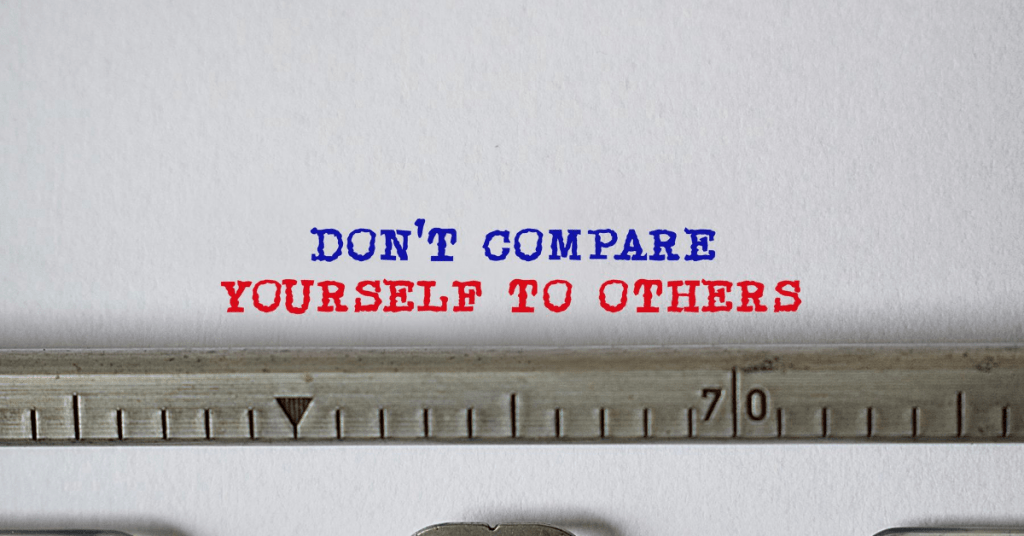When you have a goal of losing weight, your mindset is everything. This guide will help you abandon the diet mindset by teaching you how to let go of dieting and develop a more positive mindset around your body, food, and exercise.
Unfortunately, it is often the last thing on people’s minds (pun intended).

When you start losing weight, you might be so fixated on what your allowed to eat and how often you exercise, that you don’t consider the emotional and mental changes.
By fixing your mindset to one that focuses more on health and not restrictions, you are setting yourself up for success.
Here are some things to know about developing the right kind of weight loss mindset.
Abandon the Diet Mindset

Why Having a Diet Mindset is a Bad Thing
Losing weight is on many people’s minds, but wanting to lose weight and actually doing it effectively are two entirely different things.

There is so much information out there, that it becomes overwhelming.
It’s not just what diet is the best, but also the unhealthy habits that having a diet mindset can create.
In this article, you will learn about why you should ditch the diet mindset and work on developing a healthy mindset about weight loss instead.
What is a Diet Mindset?
When you have a diet mindset, you are focusing on your diet alone.
But it is not usually just eating a more balanced diet, but restricting your calories or ditching entire food groups.
You try to eat as little as possible in order to lose as much weight as you can.
These extremes create an obsession with counting calories, burning fat, and trying to “win” at weight loss. It can lead to unhealthy habits, starvation, over-exercising, and so much more.
A Better Solution
Instead of developing this extreme diet mindset, take it slow, one habit at a time.
Make a lot of what you deem your unhealthy habits, then gradually improve one habit at a time.
Do you drink a lot of soda? Replace it with sparkling water. Is your diet high in refined sugar?
Try more natural ways to get in sugar, such as fresh fruit. Do you snack throughout the day?
Try adding more protein and fiber to your meals, and you won’t feel the need for this.
You want to think about weight loss in longevity.
Sure, you could follow a strict diet and lose weight quickly, but will you keep it off? Probably not.
Take it Slowly
It will take time for your body to adapt to this new lifestyle.
Think of it this way: it took time to put the weight on your body. Therefore, it will take time to take the weight off.
So, don’t go on a diet and obsess over your weight. Simply begin to eat healthier and move around every day and your weight will naturally regulate to a healthy level.
Dieting is not a natural way for you to live. Therefore, get rid of the “diet mindset” and begin to permanently change the way you eat. Before you know it, you will trade in your overweight and unhealthy body for a stronger, fitter and healthier you.
Yo-Yo Dieting is adding to the Diet Mindset

If you have ever tried to lose weight, you probably have some experience with yo-yo dieting.
It is extremely rare for someone to pick one method of weight loss and get it right the first time.
And while there is nothing wrong with trying new things, yo-yo dieting can do a lot of damage to your body, and make it harder to lose weight.
What is Yo-Yo Dieting?
Yo-yo dieting is essentially when you continue making changes to your diet and/or fitness routine, often to the extreme.
Many yo-yo dieters don’t just start and stop the same “Diet” or method of losing weight, but often bounce from one diet to the next.
This is most commonly seen with different fad diets and trends. Like, trying low calorie, then WW, then Keto, then back to low calorie, only to go to a juice fast next.
You tend to stick to each one for the short-term. Then, either stop dieting for a while before starting the next one. Or jump immediately into a different eating plan.
Yo-Yo Dieting is Worse Than Not Dieting at all
Yes, it’s true.
You might think that even if you’re bouncing around between different diet plans and losing or maintaining your weight is a good thing, but it definitely isn’t.
Underneath the surface, you are doing more damage to your body and mental health than if you never attempted to change your eating at all.
First of all, yo-yo dieting does a number on your metabolism.
Your metabolism is smart, but it can’t handle constantly restricting calories, then over-eating calories, then restricting, then over-eating.
If your yo-yo dieting includes changing up your macros in between big binge sessions over and over again, your metabolism will likely slow down to compensate.
It is also really hard on your hormone levels.
When you have dietary restrictions, especially extreme ones, you tend to increase the amount of cortisol that your body produces. This can be bad for your heart health, among other things.
When You Get Stuck in the Fad Diet Loop
It is really easy to get caught up in fad diets.
This makes it hard to stick to just one method, without wondering what else is out there.
If you keep getting stuck in this loop where you want to bounce from one diet to the next, try these tips instead:
Take your time to research the diet or lifestyle beforehand.
Before you consider starting any type of weight loss method, diet, or lifestyle change, do your research!
This alone can often deter you from fad diets that just aren’t for you, or not really based on any scientific studies.
Realize that you are an individual with individual needs.
Just because someone else is doing a specific diet and being successful with it, does NOT mean you have to.
What works for one person is not going to work for everyone. When you find something that works for you, just keep on going.
Consider your preferences and food allergies.
A common mistake made with yo-yo dieters is that they go to these extreme diets without really understanding what it takes.
Remember to look at what foods are or aren’t allowed, what restrictions there are, and what you will actually be eating.
If you can’t have dairy because of lactose intolerance, then going on Keto where you would be eating quite a bit of cream, butter and cheese, is not your best option.
Why Your Restrictive Diet is Harming Your Weight Loss Efforts

In hopes of losing weight, some people are turning to restrictive diets, where the list of what you CAN’T have is much longer than what you CAN have.
Unfortunately, these fad diets can actually jeopardize your health. Let’s take a closer look at the potential dangers.
What is a Restrictive Diet
A restrictive diet essentially limits you from eating certain foods.
While some restrictive diets may require you to abstain from eating meat, others may frown upon consuming carbohydrates.
Regardless, the overall goal is usually to consume fewer calories than normal.
Why Are Overly Restrictive Diets So Bad?
So, what’s the problem?
Here are some reasons why you want to avoid restrictive diets – unless it is needed for a health issue or food allergy.
Triggers Overeating
The overwhelming majority of restrictive diets fail to work.
In fact, they often cause people to overeat. When deprived of food, your body naturally starts to go into hunger mode.
It doesn’t takes long before most people hit their breaking point.
Causes You to Miss Out on Important Nutrients
In order to maintain optimum health, your body needs to receive all of the required nutrients.
When eating a restrictive diet, you’ll definitely be missing out on some key vitamins and minerals.
Not only will can a nutrient deficiency weaken the immune system, but it may also lead to muscle loss.
Of course, the likelihood of you developing certain diseases increases dramatically.
Negatively Impacts Your Metabolism
Restrictive diets can cause your metabolism to slow down.
This means you won’t be burning calories nearly as quickly.
Instead of losing weight, you may actually end up packing on more pounds.
Your energy level is bound to take a big hit as well.
Signs Your Diet Is Too Restrictive
If you’re constantly stressing over every single calorie, this is a tell-tale sign your diet is too restrictive.
You should also consider your personal happiness.
When simply eating a meal becomes a source of anxiety, it’s time to seek a healthier way of life.
Ways to Avoid Restrictive Diets
One of the best ways to avoid a restrictive diet is to abide by focusing on balance of nutrients.
This will help you to eat a wide range of wholesome foods.
Be sure to eat plenty of fruits, vegetables, and grains.
While there is nothing wrong with treating yourself every so often, try to avoid consuming too many sugary snacks and high-fat dishes.
To maintain an ideal weight, you should stay active.
Exercising regularly is an important part of a healthy lifestyle.
However, you don’t have to perform any seriously intense activities. Some recommended low-impact exercises include swimming, circuit training, power yoga, and cycling.
Stop Dieting and Incorporate Healthy Eating Habits

To lose weight in a safer way, change your diet habits slowly by following one habit at a time.
Here are some of the best ways to change to healthy eating habits while also changing your mindset about foods.
Check the Condiments In Your Refrigerator
You can make a colorful salad with dark leafy greens, bright red tomatoes and slices of cucumbers. But you may ruin its calorie count with high-fat salad dressings.
Learn to read the nutrition labels of your food. Avoid condiments that have more than 5 grams of fat or sugar.
Think carefully about the condiments that you buy, but also, make sure to use the proper portion of the condiment.
Look for Leaner Meats
If you rush through the meat aisle at the supermarket, then you might grab the high-fat ground beef or the chicken thighs that have skin.
Take more time at the supermarket to find the pork, beef and poultry that have less fat.
At home, make sure to trim away any excess fat from the meat after cooking it.
Remember that most processed meat products such as fish sticks or chicken nuggets, are high in fats or oils .
Consume More Fruits and Veggies
The problem with many structured diet plans is that they don’t encourage enough healthy stuff, like fruits and veggies.
For example, low-carb diets barely allow any fruit, and get rid of quite a few vegetables.
You are missing out on a lot of vitamins and minerals by following these types of diets.
Instead, start adding fruits or vegetables to every meal or snack, and your calories will be lowered naturally while you give your body the nutrients it needs.
Nourish Your Body
To change your mindset about food and health, focus on nourishing your body, not restricting.
Don’t focus so much on calories and carbs, and instead look at what vitamins and minerals are in your food.
Each meal should have a good balance of carbs, protein, and fat, with a good amount of fiber as well.
When you fill up on these nutritious foods, you have less hunger and cravings for the unhealthy stuff.
Getting Real About Weight Loss

What are the Other Benefits of Weight Loss?
If you are on a diet, chances are good your motivation includes losing enough weight to look good in your swimsuit or fit into your best dress in time for your best friend’s wedding.

Everyone wants to look good in their clothes, but there is more to losing weight than bikinis and beach bodies.
Weight loss can help you avoid some cancers and live longer. It may also improve your sleep and enhance your sex life.
Why is this important?
Because by focusing on the other benefits of weight loss, you change your mindset about your healthy habits.
It increases your motivation and gives you something long-term to strive for.
Health Benefits of Weight Loss
As you age, it is normal find yourself in the doctor’s office.
After a certain period of time, bones and joints weaken, but being overweight can exacerbate this problem.
Your knees and back must accommodate the extra ten or fifteen pounds you have added to your frame.
This extra weight will only hasten the deterioration of those joints.
The extra pounds can also make it harder to breathe, which in turn can aggravate allergies, asthma and even sleep patterns.
Overweight folks often develop sleep apnea and wake themselves up in the night snoring.
While breathing machines can help eliminate snoring, sleep apnea often disappears on its own after a patient loses a significant number of pounds.
Doctors have also linked being overweight to some types of cancer, high blood pressure, diabetes and heart disease.
While you will definitely look better in your swimsuit if you lose a few pounds, chances are good you will feel better too.
Mental Benefits of Weight Loss
The old saying “if you look good you feel good” is actually true.
Losing weight boosts your confidence and your overall sense of wellbeing.
It can also help your sex life.
Extra weight depletes testosterone which diminishes sex drive.
As you lose weight, the testosterone is often replenished along with your desire to have sex.
Some doctors even believe women who have shed a few pounds have a better chance of getting pregnant.
Last but not least, do not forget one of the worst parts of being overweight.
If you must fly and cannot buckle your seat belt, the flight attendant is required by law to get a seat belt extender to help you securely buckle yourself into your seat.
This is a humiliating experience that can ruin your trip before you have even left the ground.
Something to think about before you reach for a second cookie.
Accept That Weight Loss Won’t Solve All Your Problems

Losing weight can often be a very positive experience. It can help to improve your overall health and potentially prevent various conditions. It can also be a great way to boost your self-esteem.
However, many people assume that losing weight will fix all of their problems.
While it has many benefits, you need to ensure that you are losing weight for the correct reasons.
The following information provides a closer look at the importance of being realistic about your weight loss goals and how it will impact your life overall as well as realistic ways it can change you for the better.
Improved Self-Esteem
As previously mentioned, losing weight can help to boost your overall level of self-confidence.
Many people are treated poorly at some point in their lives due to being overweight.
This can negatively impact the image you have of yourself.
This is because being overweight is often viewed in a negative light within our society. It is usually associated with laziness and over-indulgence.
Many people struggle to break free from a cycle of overeating and inactivity but find it difficult because it is engrained within their lifestyle.
Trying repeatedly and failing to finally lose the weight can create a vicious cycle, which can be difficult to break free from and can also negatively impact your self-confidence.
It is important to remember that losing weight will likely have a positive impact on how you view yourself but it will not be a cure for all of the underlying issues that likely lead you to overeat in the first place.
Therefore, it is important to be realistic about any changes that will occur.
Improved Mental and Physical Health
Also, as previously stated, weight loss typically can be beneficial for your overall health.
It can help to prevent certain conditions and even reverse some conditions, such as high blood pressure.
However, it is important to be realistic about this as well. While many people see positive results in their mood and overall health after losing weight, you shouldn’t view it as a cure-all.
It is important to discuss weight loss with your doctor before beginning a diet, and they will be able to help you to set realistic goals for yourself and properly inform you of what results you should expect.
Overall, it is important to lose weight for the right reasons. Improving your mental and physical well-being are great places to start.
Just remember that losing the weight won’t always fix everything, and you need to be reasonable when approaching the issue and when developing an effective plan.
As long as you keep a positive mindset and know what you are working towards, you should be able to achieve your goals and possibly improve your well-being in a realistic and achievable way.
You Will Still Have Work to Do
One of the most important things to remember about weight loss is that it is not going to miraculously solve all of your problems.
Sure, you will fit into the clothes you want and have a big boost of self-confidence, but it stops there.
It isn’t going to cure your depression and anxiety, find you a good relationship, or fix your mindset.
You are going to have to do all of that on your own.
This is important to remember because people are often under the misconception that all the problems they experience are due to being overweight, when the majority of these are probably not at all related to your size.
By understanding this, you can start a new journey of self-discovery that not only includes getting to a healthy weight, but allows you to work on your mental health at the same time.
Make a Commitment to Lose Weight

Often, making a commitment to lose weight can be quite a challenging process.
Many people resolve to lose the extra weight that is bringing them down.
However, it can be easy to get off-track and lose your motivation before you have really even begun.
This can lead to a cycle of yo-yo dieting, which can be very discouraging and can make you feel like you will never accomplish your goals.
The following information will provide a closer look at beneficial tips for making a commitment and sticking with it in order to finally make progress:
Understand the Reasons You Turn to Food
Often, overeating is caused by a deeper underlying issue.
Some people eat out of boredom and others may eat due to sadness.
Food can be very comforting and can help to take your mind off of certain issues.
However, if you find that you are using food as a tool to cope with the stresses of your life, it may be time to break the cycle. There are likely other more positive ways you can begin to fill any voids you may have.
Find Alternative Coping Mechanisms
Once you have identified the cause of your overeating, you need to begin to address this issue and find better coping mechanisms.
If you are eating out of boredom, you may want to consider taking up a new hobby that will bring more enjoyment into your life.
For example, you may want to learn to play a new instrument or try a new sport. This will help to take your mind off of eating and will allow you to focus your energy on something else.
Hold Yourself Accountable
Once you have made the commitment to finally lose the extra weight that is bothering you, you need to hold yourself accountable for your decisions.
It might be helpful to track your progress, creative short term and long term goals, and keep a food journal.
Monitoring the progress you made can help to keep you motivated and more on track in the long run.
Overall, understanding why you are overeating, finding new hobbies and activities to cheer you up and distract you, and holding yourself accountable for the decisions you make each day can make a huge difference regarding the amount of progress you are able to make.
It is important to create sustainable and realistic goals for yourself and to stick to your commitments.
If you are able to stay positive and realistic about your goals, it will make them easier to attain.
Do You Have a Fear of Hunger?

Hunger is the natural response of the body that lets you know that more fuel or food is required to keep your system from getting tired throughout the day, but it isn’t the vital fire alarm many people assume it is.
Getting low on fuel is an everyday occurrence of your natural system, so getting hungry is more like a gauge than an outright alarm; it lets you know when resources are low.
Let’s compare hunger to the gas gauge on your car. When you go to the gas station and fill up, the gauge reads FULL. After you’ve driven awhile, the level goes down.
You may be driving by a station and decide to fill it up again or you may drive right by because you still have plenty.
A fear of running out whenever you drove by a station would make you anxious and uneasy all day and always filling up needlessly.
Can you see how this explains the fear of hunger, and how it affects your weight loss?
How Can I Adjust This Fear of Hunger?
To break the habit of the fear of hunger occurring at inopportune moments when you are away from your good, healthy food sources, let’s look at the gas gauge example again.
Your mind is going to help your body balance these feelings out, so you can continue with your new food plan and get the results you are looking for!
Here’s the self-talk to put into action and eliminate the fear of hunger:
- “Fill up” on nutritious foods at regular intervals, including a healthy breakfast, mid-day meal, and dinner.
- Acknowledge that your fuel gauge is going decrease as your body uses the food, and agree to three healthy snacks to go with the three meals before you start the day. This way you are mentally prepared to battle the hunger alert.
- With this new attention to your fuel gauge, remember it will get low and that your body may send the signal, HUNGRY, but you are ready with the answer. Your reply to your anxious stomach is, “it’s almost time to drive by a food station and stop for a meal or a snack, but, until then, I’m going to fill you up with a bottle of water or tea!”
Try this for a few days to combat those unexpected hunger alarms, and your mind and body is going to get the message that you are in control now!
Common Triggers for Binge Eating

Binge eating occurs when you want to consume large quantities of food at one time, and it leads to poor health.
Compulsive overeating has some common triggers, and it often occurs with crash diets that restrict food intake too much.
It is essential to have healthier eating habits to have the appropriate mindset to lose weight.
Here are some of the triggers that can lead to binge eating.
Mood Disorders
When you are engaging in extreme dieting, it can change your brain’s chemistry, leading to mood disorders.
You may feel anxious or depressed, and these feelings can make you crave large amounts of food.
After not eating for a day or limiting your calories for a week, you may begin eating compulsively until you are ill.
This is an unhealthy way to live, and it can lead to gaining weight rather than losing weight.
Genetic Structure
Researchers believe that there is a genetic component involved in binge eating disorders.
If you have a parent who has an eating disorder, then you are more likely to have the same problem.
When you are aware that a binge disorder is part of your genetic structure, it is more important to choose a healthy dietary plan.
Poor Self-esteem
If you lack confidence, then the inability to lose weight to have a trim physique may lead to bad habits such as binge eating.
When someone makes a rude remark to you about your weight, you may starve yourself for a day or two in an attempt to lose the pounds faster.
When you don’t lose weight right away, you feel worse, causing you to eat compulsively.
Low Blood Sugar
When you restrict your caloric intake for several days, it can lead to low blood sugar that makes you feel lethargic.
Your brain will send signals to your stomach that leads to additional stomach acids, and you will develop a strong craving for food.
Eventually, all you can think about is eating, and when you do begin to consume food, you may overeat to compensate for your low blood sugar levels.
How Can You Prevent Binge Eating?
To prevent binge eating, don’t use binge dieting plans that cause intense cravings or low blood sugar levels.
Choose a healthy diet plan that includes a wide variety of foods, and make sure you are not under eating.
Many people have found links between extreme dieting and binge eating.
If you restrict food for too long, you eventually get to a point where you have big binges of all the foods you denied yourself, go back on your diet, then go back to binging.
To stop this cycle, you need to nourish your body properly and keep a healthy balance between diet and exercise.
How to Cope Without Food

Do you reach for food in times of stress?
This is an all too common coping mechanism that leads to bad habits and hinders weight loss.
If you want to have a successful relationship with food and achieve your weight loss goals, it’s vital you reshape the way you think about eating.
Food is meant to serve as fuel, not as a reward or as a distraction.
Everyone feels stress. This is an unavoidable fact, and if eating is your go-to for dealing with it then you will be doomed to diet failure.
Luckily, there are many alternatives you can try instead munching on that calorie laden snack when you start to feel anxious.
Regular Exercise
Exercise produces endorphins.
When these chemicals are released, they interact with receptors in the brain that make you feel good and reduce pain.
This has a tremendous stress reduction effect. Getting in the habit of taking a walk or doing a few crunches when you feel anxious can make a world of difference along your weight loss journey.
Meditation
When you start to feel overwhelmed, take a deep breath and spend a few quiet moments meditating.
If you are at home, you might want to try a guided meditation video, but meditation is something you can do anywhere.
If you are out in public, simply take a few deep breaths and focus on your breathing until you feel your body begin to calm.
Get a Hobby
Instead of using your hands for eating, busy your hands with a hobby.
You can try crocheting, woodworking, folding origami, playing guitar, solving crossword puzzles, or maybe even buying a Rubik’s Cube.
Anything that can keep your hands busy and your mind off your problems can prevent you from overeating.
Massage
Instead of doing something detrimental to your body by overeating when you feel stressed, try treating your body with kindness.
Treat yourself to a calming massage. Massage relaxes the body, eases pain, and helps to take your mind off daily pressures.
Focusing on something positive, like a massage, can help to reset your thinking and allow you to better cope with life’s stressors.
It is important that you act mindfully when you take any action that impacts your body and your health.
By dealing with stress in a positive way, you will be one step closer to achieving your weight loss goals.
How to Ditch the Diet Mindset For Good

Why Comparisons During Weight Loss Can Be Toxic
Weight loss is a challenging process, and one that can be taxing on your body and your emotional health.

One of the issues people often face is in comparisons.
Comparing yourself to other people, how much weight they have lost, their fitness routine, and the type of diet they follow.
But you are a unique individual, and you are going to have a different weight loss journey that most other people.
This section is going to explore some reasons why comparisons during your weight loss journey can hurt your progress.
The Comparisons Are Unhealthy
Let’s get this out of the way: We’ve all done it.
We’ve all made comparisons.
We’ve all wondered what they were doing that we weren’t, why we don’t measure up.
There’s no judgment, but please understand that this is an unhealthy mindset.
Comparing your diet, your exercise, or your body to other peoples’ is a recipe for depression and self-loathing. You don’t deserve that kind of pain in your life.
Be Kind to Yourself
Consider this:
Would you go up to somebody and ask them why their diet is so bad?
Why they don’t exercise enough?
You wouldn’t, right? That would be rude!
Well, if you wouldn’t treat another person that way, why would you treat yourself that way?
It’s easy to be critical of yourself. It’s hard to be kind, especially when it comes to weight loss.
Still, try your best to be compassionate with yourself. Self-criticism and comparison can only lead to bitterness.
Your Journey Is Your Own
There’s something that you should consider when you start comparing your weight loss to other peoples’.
Why are you losing weight? Is it for them, or is it for you?
Hopefully, it’s the latter. Weight loss is an individual journey.
It has nothing to do with other peoples’ expectations, ideas, or thoughts. You’re losing weight for you and you alone. It’s not for anybody else. Don’t lose sight of that.
The best friend you have on your weight loss journey is yourself.
You’re the one making the decisions and putting in the work.
In the end, you’re losing weight because you want to.
Comparisons are easy to make, but they’re not healthy and they’re not helpful.
Just remember to be kind to yourself and show yourself the same compassion that you would show to anyone else. You deserve it.
How to Reframe Your Thoughts for Weight Loss

Weight loss isn’t the easiest thing to do, and even harder when you consider the mental and emotional struggles.
But people lose weight every day – so how do they do it successfully? For the people who not only lose the weight, but keep it off, it takes more than just diet and exercise.
They also work a lot on their mental health and have the right type of mindset for success. Here are some things you can do to develop a healthy weight loss mindset.
Find Long-Term Reasons to Lose Weight
You might have some reasons about losing weight in more of the short-term, like fitting in to your favorite outfit, wearing a bikini over the summer, or attending a wedding later in the year.
These are perfectly good reasons, but won’t help with long-term success. For a mindset shift, make a list of as many benefits as you can see, years down the road.
Things like improving your physical and mental health, boosting your confidence and self-esteem, preventing diseases like diabetes, having the stamina to keep up with your kids and grandkids. These are still healthy reasons to lose weight, but are more something to look forward to in the long-term.
Accept Your Body as it is Now
This might seem counterintuitive, but if you hate the way you look and are just desperate to change your body, it is going to make it really hard to lose weight.
This tends to mess with your mind.
You start negative self-talk, which destroys your self-esteem, which can then wreak havoc on your motivation. Hating your body’s size might get you started with weight loss, but it won’t keep you going.
Instead, be positive and optimistic, but appreciate the body you have now.
Thank it for getting you this far, for allowing you to do your daily activities.
Appreciate your body for everything it does for you, and compliment your body every single day.
When you get to a place of acceptance, it is amazing how much easier weight loss actually becomes.
Focus on Habits, Not Diets
A diet is simply a way of eating, but a crash diet is one where you make a lot of restrictions that ultimately lead you feeling hungry and unsatisfied.
That is the type of diet to stay away from. How you lose weight should be how you want to live the rest of your life, so keep that in mind.
This is why changing your habits is the way to go. This is going to help you reframe your thoughts and your mindset, but also make long-term weight loss more attainable.
Affirmations for a Positive Weight Loss Mindset

Affirmations encourage self-change when you use them.
They act as reminders and inspiration to help you focus on your weight loss goals during your day. The most significant benefit gained from using affirmations is that they focus attention on your goals and promote positive thoughts through a considerable change in your life.
Finding Your Weight Loss Affirmations
When you look for a weight loss affirmation, seek out a positive statement about your weight loss process.
Always use first person tense when creating a powerful affirmation.
Also, apply the statement directly to you and your situation. It should be full of positive, emotional comments about your weight loss and your body.
A strong connection exists between mind-body experiences and words of emotion.
So, instead of saying, “I only eat healthy food,” try saying something like “I feel much healthier and happier when I eat healthy food.
Weight loss affirmations should also be written in the present tense. Even though you don’t feel a certain way about your weight loss yet, you speak towards a goal.
Examples of Affirmations
Here are some weight loss affirmations that can get you started. Please feel free to rewrite these for your body or personal situation.
- I become a better me when I eat well.
- I enjoy eating tasty new foods that help me lose weight.
- I achieve my weight loss goal by eating healthier every day.
- I am thankful to be able to move and exercise.
- I feel invigorated after an active workout.
- Getting in shape helps me feel better about my life.
- My clothes fit better.
- My clothes are becoming too big.
- When I look in the mirror, I observe a new, healthier me.
- I feel my muscles becoming stronger.
- I enjoy learning new, healthier recipes.
- I’m working health and fitness into my everyday life.
- I’m like a cocoon turning into a butterfly, making positive changes in my life and body.
- I deserve a healthy body and life.
- I am giving myself a slim, fit body I deserve.
- I am worth the effort of eating right and exercising.
Try using affirmations in your weight loss journey today.
Use these simple, encouraging statements to change the way you think and feel.
You can write them daily in your journal, have sticky notes on your mirror, or have reminders in your phone to repeat the affirmations each day.
Envision a Healthier Life after Weight Loss

If you’re someone who has hit their weight loss goal, you might be tempted to ease up on your regiment and lose consciousness of your healthy choices.
By all means, when you achieve a weight loss goal, you should celebrate and indulge within moderation.
How do you continue to be cognizant about your success and how do you prevent yourself from slipping back into your old habits?
Embracing a Mindset of Mindfulness
Think about the way you feel right now.
Briefly close your eyes and open them and listen to the sounds around you. Take a deep breath and repeat this process until your anxieties are dulled and cravings are muted.
Once you’ve calmed down from your hunger pains, drink some water and take big deep breathes.
It’s important to be mindful of how you feel and check in with yourself and your surroundings.
No one is making you eat but yourself. Think about how hard you worked to achieve your success and use that as motivation to encourage yourself to continue to make good decisions.
Input = Output
What you put into your body is usually what you get out of your body. If you put junk into your body, you’ll likely get junk results.
You’ll lost the weight by developing healthy habits.
If you somehow lost weight before with unhealthy habits but were unable to keep it off, there’s no better time to commit a healthy lifestyle than right now to finally lose weight and keep it off.
There’s nothing wrong with recommitting yourself to a healthy lifestyle.
Just continue to repeat to yourself small, simple daily habits and think about the things you need to continue doing in order to maintain that success.
Commit to Being Happily Ever After
People who have lost weight are very aware of how certain foods impact their waistline.
If you had a trouble food like pizza or ice cream, you should approach these foods with strict limits for consumption so that you aren’t tempted to go off the rails.
Your weight loss journey should have a happily ever after ending.
If you are a yo-yo dieter or someone who cannot commit to a lifestyle that limits their caloric intake to the same level as their metabolic rate, you need to be honest with yourself about this and retake the steps that provided you with your initial weight loss success.
From there, you should commit to building momentum and using the lessons learned from a food relapse as a force multiplier.
Journaling Your Way to Weight Loss

One of the most effective tools for improving your mindset about anything, including losing weight, is with a journal.
I know what you’re thinking – you’re getting a little tired of this tip every time you read about anything.
But the reason it is brought up so often is because it works! If you have not really attempted journaling before, now is the perfect time to go all in.
3 Ways to Use a Journal for Weight Loss
There are a few different ways you can use a journal for the intended purpose of losing weight.
Not just for the weight loss itself, but improving your mindset and thought process about what weight loss means to you.
Here are the 3 techniques to try out:
1. Creating a Plan of Action – and Sticking to it.
Journaling is an excellent way to set goals, create actionable tasks, and stick to them.
For weight loss, this might mean choosing a specific diet, writing notes about a new workout routine, or just wanting to change to healthier habits.
Write them all down in your journal, and be as specific as possible. Write down exactly what you plan to do and when to do it.
2. Journaling the Details of Your Progress.
You can also use your journal to record your progress along the way, both successes and possible gains.
Depending on the type of journal you use, you can have a page where you record your weight or inches as you progress, write entries about how you think it’s going, and even write about when you think you made a mistake or you feel like you want to try something different.
3. Writing Out Your Thoughts and Feelings.
Don’t forget about the traditional form of journaling, where you write about what you’re thinking and how you’re feeling.
You can use your journal to write down when you feel great with lots of energy, when something you ate didn’t make you feel satisfied, and when you have emotional eating urges or even have a binge.
All of this matters and is going to help you see your own habits and make appropriate changes.
More Tips for Journaling Success
To make your journal work for you, here are a few more tips to keep in mind:
Skip the “Rules” of Writing.
This is really important, because if you are too concerned about HOW you write, you won’t focus as much about WHAT you write.
Your journal is yours, not to be seen by anyone else.
Which means you don’t need to worry about writing rules like spelling, grammar, or sentence structure. Just get the words out on paper in whatever way you want.
Switch Things Up Whenever You Want.
This is YOUR journal, to be used how YOU want!
If you started with one method of journaling your weight loss progress, then decided on switching to a bullet journal, go for it!
That is the beauty of something like a journal that is so customizable.
Try Out Stream of Consciousness Writing.
When you do stream of consciousness writing, you write as much as you can, and whatever first comes to mind.
You can set a number of pages to write or set a timer, but you definitely don’t have to. The point is to just dump all those thoughts out of your head onto paper.
Conclusion
I know this was long but I hope you found it helpful.
Honestly, the first step to successful weight loss isn’t a new diet or exercise routine – it’s your mind and setting it up for success:
- Ditch the all or nothing thinking – progress over perfection and only change one thing at a time when you are ready.
- Stop mentally beating yourself up with the negative self talk – you are human and when something doesn’t go the way you want then take a step back and see what happened and what can be different next time.
Remember – you can do this!
I am cheering you on every step of the way 🎉🎉🎉

Lara is the health coach (who loves junk food) and personal trainer (who hates exercise) behind Healthy Habits Momma. She is a SAHM to 2 teens and 1 adult. She is also an occasional farmer’s wife👩🌾. Lara has been using small daily habits for several years to create a healthier lifestyle for herself and her family. She uses her blog to help herself stay accountable and hopes it inspires other moms to create a fit, healthy, and happy life for themselves.

